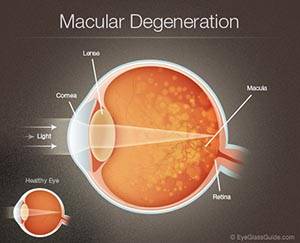
There are various types of macular degeneration. However, the most common form is associated with aging, this eye disease is also called age-related macular degeneration (ARMD).
The main symptom of Macular Degeneration is slowly losing vision in the central part of sight. This loss precludes the ability to do many everyday activities, including reading and driving. It also reduces your ability to see intricate details such as small prints and patterns.
The leading cause of vision loss in older Americans, 60 and older, is ARMD. There are two forms of this disease, wet macular degeneration and dry macular degeneration. Both forms affect the central portion of the retina, which is the light-sensitive section located in the back of the eye. This part of the eye processes images and is essentially responsible for sight. The dry form of ARMD is more common than the wet form. In fact, almost 90% of ARMD is the dry form.
Statistics
The leading cause of losing vision in people over 60 years of age is macular degeneration. There are various risk factors, including smoking, obesity, and exposure to UV rays. Caucasians are at a significantly greater risk for contracting ARMD than African Americans. Additionally, macular degeneration affects women in greater numbers than men, and has a genetic component.
Special thanks to the EyeGlass Guide, for informational material that aided in the creation of this website. Visit the EyeGlass Guide today!